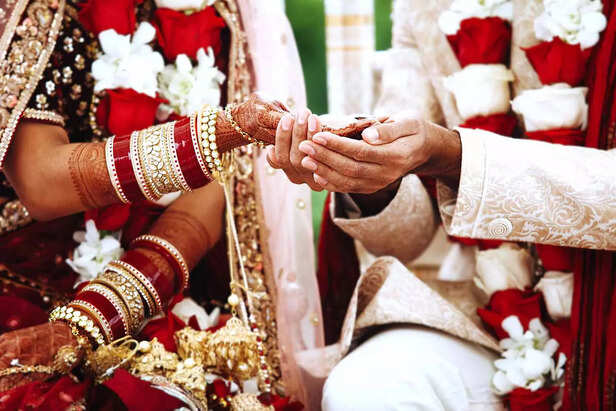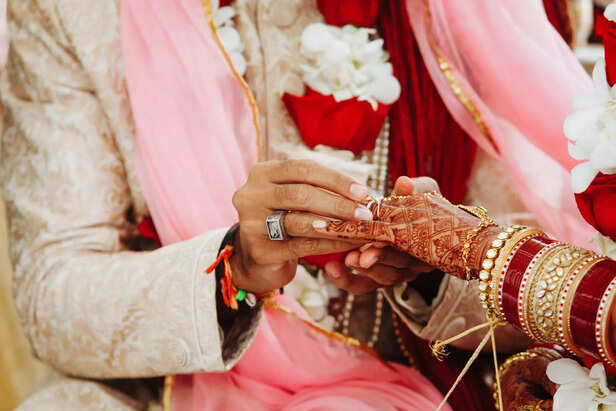Best Age to Marry? 20s, 30s, 40s Pros & Cons Revealed
Abhishek dehariya | Jul 27, 2025, 20:30 IST
( Image credit : Freepik )
Marriage isn't a one size fits all journey some find "the one" at 22, others at 42. But is there really a perfect age to say "I do"? This thought-provoking read breaks down the emotional highs, social pressures, biological truths, and psychological effects of marrying at every decade of adulthood. Whether you're in your 20s dreaming of romance or in your 40s prioritizing stability, this article will help you reflect deeper on when to marry and why.
Marriage is one of the biggest decisions we make in life. It defines our emotional stability, social identity, and even professional direction. But when is the right time to marry? Is it better to marry young when hearts are fearless, or later when minds are mature?
As society evolves, so do the expectations around marriage. Today, many people marry later or choose to remain single challenging traditional norms. This article explores the pros and cons of marrying in your 20s, 30s, 40s, and beyond, backed by real-life insight and human emotions.

In your 20s, life is full of energy, dreams, and flexibility. You're more open to adjusting, exploring, and growing with your partner. Love in this stage is often pure and less transactional. The biological clock is also in your favor fertility and health are optimal for family planning. Emotionally, young couples often build deep bonds over shared struggles be it career growth or finances. Many successful marriages bloom from this shared journey.
But marrying too early can sometimes mean rushing in without full self-awareness. You may still be figuring out your values, ambitions, and personal boundaries. Financial instability and emotional immaturity can cause friction.
Psychological Note: Studies show early marriages may be more vulnerable to divorce if there's a lack of communication or emotional depth.
By the time you're in your 30s, you likely know who you are. You’ve built a career, experienced relationships, and understand your non-negotiables. Marriages in this age bracket often come from a place of maturity rather than pressure. You're more emotionally intelligent, financially independent, and capable of managing conflicts gracefully. Parenting in your 30s also means you're emotionally equipped to handle the responsibilities.
The flip side? You may become too rigid or "set in your ways," making compromises difficult. Societal pressure may increase, especially for women, due to the ticking biological clock. There’s also the tendency to settle not out of love, but out of fear of "running out of time."
Emotional Insight: Love in your 30s tends to be more mindful, but also more cautious.
In your 40s, you're emotionally evolved. You've likely faced failures, heartbreaks, growth and emerged wiser. You don’t seek validation anymore; instead, you seek companionship, shared values, and peace. You're financially secure and can offer emotional depth to your partner. The desire for real connection over superficial attraction often leads to deep, meaningful marriages. Many second marriages that start in this phase are more successful due to emotional maturity.
Challenges may arise in blending lifestyles, children (if any), or managing health and fertility concerns. There can also be baggage emotional or otherwise that affects new relationships.
Real Life: Many people in their 40s fear starting over, which can delay decisions or cause insecurity in relationships.
Marriage after 50 is rarely about pressure or expectations. It’s about choice. You’ve lived life, understood solitude, and now if you marry, it’s out of a deep desire for true companionship. Communication is honest, mature, and drama-free. You're not marrying for society, parents, or status you're doing it for yourself.
Health issues, family resistance (especially from grown-up children), or difficulty adapting to a new lifestyle can be real challenges. Also, integrating lives at this stage may need more patience and practical adjustments.
Philosophical Truth: At 50+, marriage is not a union of bodies or statuses it is a meeting of souls.
Across all ages, one thing remains constant pressure. From relatives, friends, or society telling you when it’s the “right” time. But what matters more than age is awareness. Knowing who you are, what you want, and whether you're ready to give and grow in a relationship.
Marriage done to escape loneliness or fulfill expectations rarely brings lasting joy.
Especially for women, the idea of a “biological clock” is often used as emotional blackmail. While fertility does decline with age, science now provides IVF, egg freezing, and other options. For men too, sperm quality drops after 40.
But it’s crucial to remember: parenting is not just biology, it’s responsibility, patience, and unconditional love.
Many delay marriage due to career growth. That’s okay ambition is important. But so is human connection. Ideally, you don’t have to choose one over the other. A supportive partner can actually boost your career, not hinder it.
Pro Tip: Don’t wait for the “perfect time.” Wait for the right mindset and right person.
There's no golden age for marriage. Some marry at 25 and live beautifully together forever. Others marry at 45 and find joy anew. What matters is emotional readiness, shared values, mutual respect, and long-term vision. Marriage isn't about age it's about alignment.

So, what’s the best age to marry? There is no universal answer. The 20s bring spontaneity, the 30s offer maturity, the 40s deliver stability, and 50+ grants peace. Each phase has its beauty and its baggage. What truly matters is not when you marry, but why and how.
The real question isn’t “What age is best to marry?”
It’s "Are you marrying from pressure or from power?
Explore the latest trends and tips in Health & Fitness, Travel, Life Hacks, Fashion & Beauty, and Relationships at Times Life!
As society evolves, so do the expectations around marriage. Today, many people marry later or choose to remain single challenging traditional norms. This article explores the pros and cons of marrying in your 20s, 30s, 40s, and beyond, backed by real-life insight and human emotions.

marriage
( Image credit : Freepik )
1. Marrying in Your 20s: The Age of Passion & Possibility
Pros:
Cons:
Psychological Note: Studies show early marriages may be more vulnerable to divorce if there's a lack of communication or emotional depth.
2. Marrying in Your 30s: The Age of Clarity & Confidence
Pros:
Cons:
Emotional Insight: Love in your 30s tends to be more mindful, but also more cautious.
3. Marrying in Your 40s: The Age of Stability & Self-Respect
Pros:
Cons:
Real Life: Many people in their 40s fear starting over, which can delay decisions or cause insecurity in relationships.
4. Marrying After 50: The Age of Wisdom & True Companionship
Pros:
Cons:
Philosophical Truth: At 50+, marriage is not a union of bodies or statuses it is a meeting of souls.
5. Social Pressure vs Self Awareness: A Hidden Battle
Marriage done to escape loneliness or fulfill expectations rarely brings lasting joy.
6. Biological Clock: Myth, Fact & Modern Science
But it’s crucial to remember: parenting is not just biology, it’s responsibility, patience, and unconditional love.
7. Career vs Marriage: Balance Is the Key
Pro Tip: Don’t wait for the “perfect time.” Wait for the right mindset and right person.
8. Timing Isn't Everything, Readiness Is

wedding
( Image credit : Freepik )
Age Is Just a Number, Readiness Is Everything
The real question isn’t “What age is best to marry?”
It’s "Are you marrying from pressure or from power?
Explore the latest trends and tips in Health & Fitness, Travel, Life Hacks, Fashion & Beauty, and Relationships at Times Life!
